#Getting things done
Explore tagged Tumblr posts
Text
Keeping a suspense file gives you superpowers
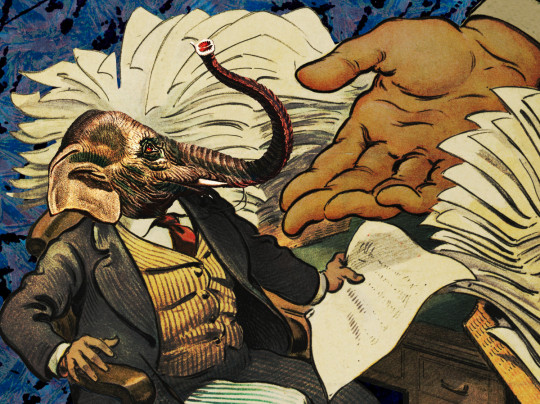
I'll be in TUCSON, AZ from November 8-10: I'm the GUEST OF HONOR at the TUSCON SCIENCE FICTION CONVENTION.

Two decades ago, I was part of a group of nerds who got really interested in how each other managed to do what we did. The effort was kicked off by Danny O'Brien, who called it "Lifehacking" and I played a small role in getting that term popularized:
https://craphound.com/lifehacksetcon04.txt
While we were all devoted to sharing tips and tricks from our own lives, many of us converged on an outside expert, David Allen, and his bestselling book "Getting Things Done" (GTD, to those in the know):
https://gettingthingsdone.com/
GTD is a collection of relatively simple tactics for coping with, prioritizing, and organizing the things you want to do. Many of the methods relate to organizing your own projects, using a handful of context-based to-do lists (e.g. a list of things to do at the office, at home, while waiting in line, etc). These lists consist of simple tasks. Those tasks are, in turn, derived from another list, of "projects" – things that require more than one task, which can be anything from planning dinner to writing a novel to helping your kid apply to university.
The point of all this list-making isn't to do everything on the lists. While these lists do help you remember what to do next, what they're really good for is deciding what not to do – at all. The promise of GTD is that it will help you consciously choose not to do some of the things you set out to accomplish. This is in contrast to how most of us operate: we have a bunch of things we want to do, and we end up doing the things that are easiest, or at top of mind, even if they're not the most important things.
GTD recognizes that you can be very "productive" (in the sense of getting many things done) and still not do the things that you really wanted to do. You know what this is like: you finish a Sunday with an organized sock-drawer, all your pennies neatly rolled, the trash-can in your car emptied…and no work at all on that novel you're hoping to write.
You can't do everything, but you can control what you don't do, rather than just defaulting into completing a string of trivial, meaningless tasks and leaving the big stuff on the sidelines. Organizing your own tasks and projects is a hugely powerful habit, and one that's made a world of difference to my personal and professional life.
But while good to-do lists can take you very far in life, they have a hard limit: other people. Almost every ambitious thing you want to do involves someone else's contribution. Even the most solitary of projects can be derailed if your tax accountant misses a key email and you end up getting audited or paying a huge penalty.
That's where the other kind of GTD list comes in: the list of things you're waiting for from other people. I used to be assiduous in maintaining this list, but then the pandemic struck and no one was meeting any of their commitments, and I just gave up on it, and never went back…until about a month ago. Returning to these lists (they're sometimes called "suspense files") made me realize how many of the problems – some hugely consequential – in my life could have been avoided if I'd just gone back to this habit earlier.
My suspense file is literally just some lines partway down a text file that lives on my desktop called todo.txt that has all my to-dos as well. Here's some sample entries from my suspense file:
WAITING EMAIL Sean about ENSHITTIIFCATION manuscript deadline 10/24/24 WAITING EMAIL Russ about missing royalty statement 10/12/24 WAITING EMAIL Alice about Christmas vacation hotel 10/8/24 10/20/24 WAITING EMAIL Ted about Sacramento event 8/12/24 9/5/24 10/5/24 10/20/24
WAITING CALL LA County about mosquito abatement 10/25/24 WAITING CALL School attendance officer about London trip 10/18/24
WAITING MONEY EFF reimbusement for taxi to staff retreat $34.98 10/7/24
WAITING SHIPMENT New Neal Stephenson novel from Bookshop.org 10/23/24
This is as simple as things could possibly be! I literally just type "WAITING," then a space, then the category of thing I'm waiting for, then a few specifics, then the date. When I follow up on an item, I add the date of the followup to the end of the line. If I get some details that I might need to reference later (say, a tracking code for a shipment, or a date for an event I'm trying to organize), I'll add that, too, as it comes up. Creating a new entry on this list takes 10-25 seconds. When someone gets back to me, I just delete that line.
That is literally it.
Every day, or sometimes a couple of times a day, I will just run my eyes up and down this list and see if there's anything that's unreasonably overdue, and then I'll send a reminder or make a followup call. In the example above, you can see that I've been chasing Ted about Sacramento for months now (this is a fake entry – no plans to go to Sacto at the moment, sorry):
WAITING EMAIL Ted about Sacramento event 8/12/24 9/5/24 10/5/24 10/20/24
So now I've emailed Ted four times. Maybe my email's going to his spam, and so I could try emailing a friend of Ted and ask them to check whether he's getting my messages. But maybe Ted's trying to send me a message here – he's just not interested in doing the event after all. Or maybe Ted is available, but he's so snowed under that he's in danger of fumbling it, and I need to bring in some help if I want it to happen.
All of these are possibilities, and the fact that I'm tracking this means that I now get to make an active decision: cancel the gig or double down on making sure it happens. Without this list, the gig would just die by default, forgotten by both of us. Maybe that's OK, but I can't tell you how many times I've run into someone who said, "Dammit, I just remembered I was supposed to email you about getting that thing done and I dropped the ball. Shit! I really was looking forward to that. Is it too late now?" Often it is too late. Even if it's not, the work of picking up the pieces and starting over is much more than just following through on the original plan.
Restarting my suspense file made me realize how many of the (often expensive or painful) fumbles I've had since the pandemic were the result of me not noticing that someone else hadn't gotten back to me. In essence, a suspense file is a way for me to manage other people's to-do lists.
Let me unpack that. By "managing other people's to-do lists," I don't mean that I'm deciding for other people what they will and won't do (that would be both weird and gross). I mean that I'm making sure that if someone else fails to do something we were planning together, it's because they decided not to do it, not because they forgot. As GTD teaches us, the real point of a to-do list isn't just helping us remember what to do – it's helping us choose what we're not going to do.
This is not an imposition, it's a kindness. The point of a suspense file isn't to nag others into living up to their commitments, it's to form a network of support among collaborators where we all help one another make those conscious choices about what we're not going to do, rather than having the stuff we really value slip away because we forgot about it.
I have frequent collaborators whom I know to be incapable of juggling too many things at once, and my suspense file has helped me hone my sense of when it would be appropriate to ask them if they want to do something together and when to leave them be. The suspense file helps me dial in how much I rely on each person in my life (relying on someone isn't the same as valuing them – and indeed, one way to value someone is to only rely on them for things they're able to do, rather than putting them in a position of feeling bad for failing you).
Lifehacking gets a bad rap, and justifiably so. Many of the tips that traffick as "lifehacks" are trivial or stupid or both. What's more, too much lifehacking can paint you into a corner where you've hacked any flexibility out of your life:
https://locusmag.com/2017/11/cory-doctorow-how-to-do-everything-lifehacking-considered-harmful/
But ever since Danny coined the term "lifehack," back in 2004, I've been cultivating daily habits that have let me live the life I wanted to live, accomplishing the things I wanted to accomplish. I figured out how to turn daily writing into a habit and now I've written more than 30 books:
https://www.locusmag.com/Features/2009/01/cory-doctorow-writing-in-age-of.html
A daily habit of opening a huge, ever-tweaked collection of tabs has made me smarter about the news, helped me keep tabs on my friends, helped me find fraudsters who were trying to steal my identity, and ensured that all those Kickstarter rewards and other long-delayed, erratic shipments didn't slip through the cracks:
https://pluralistic.net/2024/01/25/today-in-tabs/#unfucked-rota
Daily habits are superpowers. Once something is a habit, you get it for free. GTD turns on decomposing big, daunting projects into bite-sized, trackable tasks. I have a bunch of spaces around the house – my office, my closet, the junk sheds down the side of the house, our tiki bar – that I used to clean out once or twice a year. Each one was all-day, sweaty, dirty job, and for most of the year, all of those spaces were a dusty, disorganized mess.
A month ago, I added a new daily task: spend five minutes cleaning one space. I did the bar first, and after two weeks, I'd taken down every tchotchke and bottle and polished it, reorganizing the undercounter spaces where things pile up:
https://www.flickr.com/search/?user_id=37996580417%40N01&sort=date-taken-desc&text=tiki+bar&view_all=1
Now I'm working through my office. Ever day, I'm dusting a bookshelf and combing through it for discards to stick in our Little Free Library. Takes less than five minutes most day, and I'll be done in about three weeks, when I'll move on to my closet, then the side of the house, and then back to the bar. A daily short break where I get away from my computer and make my living and working environments nicer is a wonderful habit to cultivate.
I'm 53 years old now. I was 33 when I started following Getting Things Done. In that time, I've gotten a lot done, but what's even more relevant is that I didn't get a ton of things done – things that I consciously chose not to abandon. Figuring out what you want to do, and then keeping it on track – in manageable, healthy, daily rhythms that bring along the other people you rely on – may not be the whole secret to a fulfilled life, but it's certainly a part of it.

Tor Books as just published two new, free LITTLE BROTHER stories: VIGILANT, about creepy surveillance in distance education; and SPILL, about oil pipelines and indigenous landback.
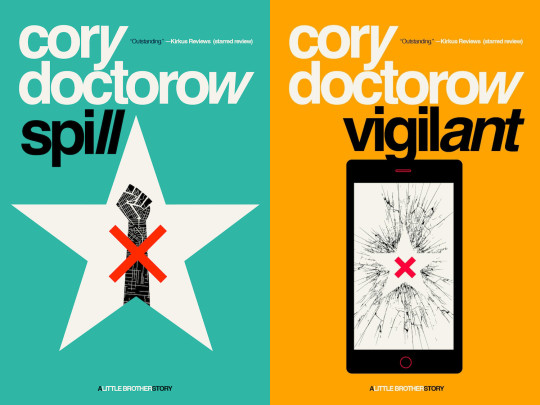

If you'd like an essay-formatted version of this post to read or share, here's a link to it on pluralistic.net, my surveillance-free, ad-free, tracker-free blog:
https://pluralistic.net/2024/10/26/one-weird-trick/#todo.txt
#pluralistic#gtd#lifehacks#getting things done#being busy#correspondence#deliberately choosing what you abandon
314 notes
·
View notes
Text

110 notes
·
View notes
Text
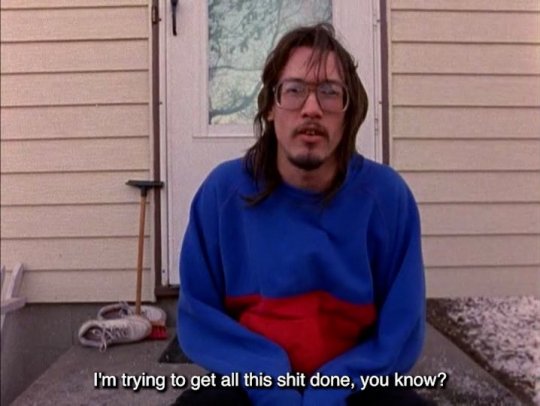
Mark Borchardt, American Movie (1999)
47 notes
·
View notes
Text

15 notes
·
View notes
Text



9 notes
·
View notes
Text
How to get shit done
I have a tendency to struggle with what others would call "executive dysfunction." It looks like ADHD from the outside, which is fair, people with ADHD tend to struggle with executive dysfunction AFAIK (im not a psychologist) but they are not one and the same. IN ANY CASE, I have a lot of different interests, hobbies, and projects I work on and juggle and I used to struggle a lot with progressing. In fact prior to about a week ago, I was flatlining. I wasn't getting ANYTHING done. The entire month of May was just me barely existing. But, I figured out a solution, which may be obvious BUT! Choose one thing. Create a small, easily achievable goal for it. Stick to it until it is complete, no matter how annoyed you get or how long it takes. If you do the "small, easily achievable goal" part right, you won't get annoyed. I guess this is within the SMART framework but I'm putting it in slightly easier to digest terms. Here's a fun example, and one I am proud of, from the first day: Beat this (one i was stuck on) level in Quake. That's it! I literally couldn't bring myself to play VIDEO GAMES I was flatlining so badly. But putting something into small, easily achievable goals, I was able to beat that level in Quake, and I actually did something. I did this with a few things, all in that same day! Finish this small part of this program. (a programming project I was working on) Practice drawing for 15 minutes. (a skill I had been neglecting) Start learning blender, and get familiar with some very minor basics. (This was a bit less defined, but I still got more done just telling myself to start on it and learn something rather than not doing anything) And a few other things I don't quite remember. Anywho, that one day was the most productive I had felt personally for months. And since, not even a week later, I've been getting stuff done and I feel good about it. I feel better.
Hope this helps anyone stuck in this same rut.
2 notes
·
View notes
Text
Seven loads later, the compost pile is emptied and spread into the garden!
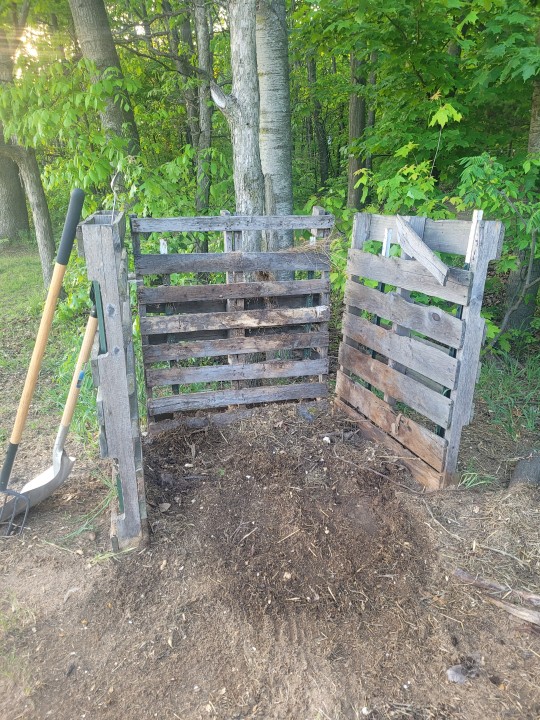
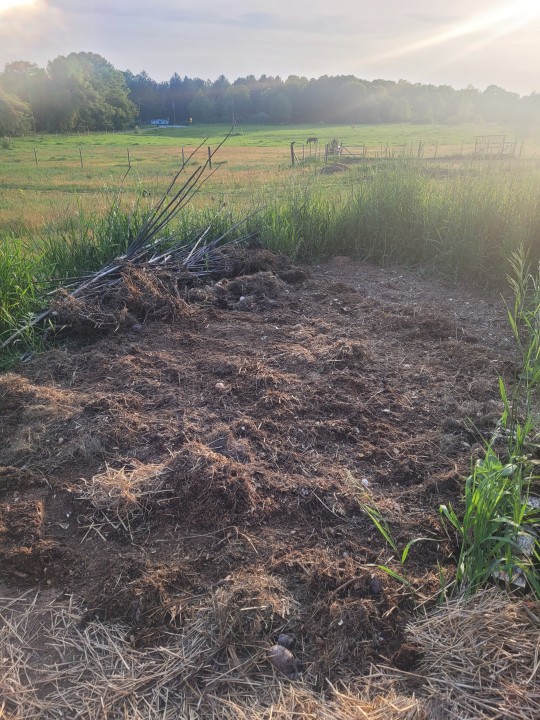
I also managed to fix the mower!

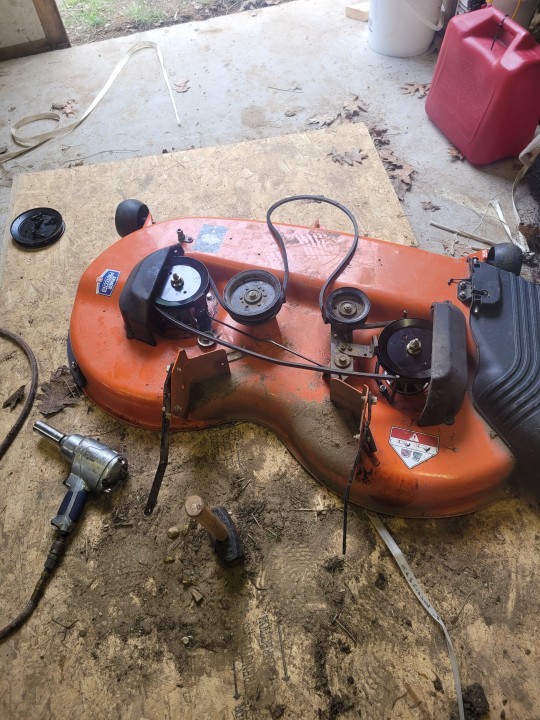
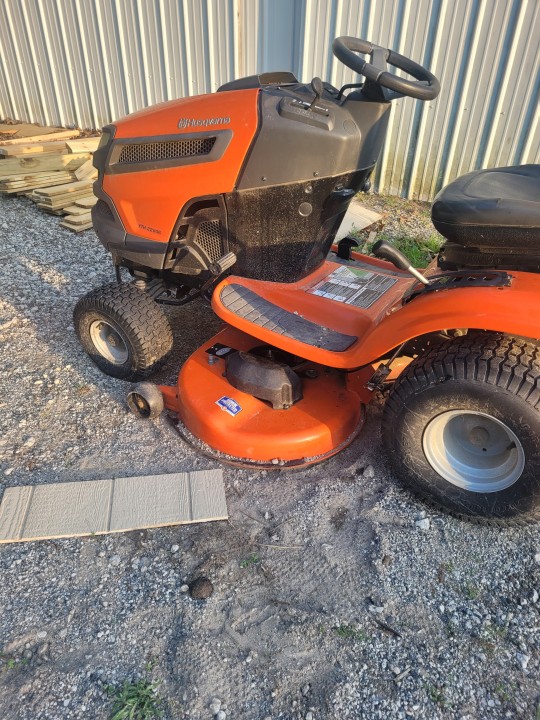
I had hit a large rock (that the kids had thrown into the tall grass) that broke a spindle and bent the blade. I had to drop and tear apart the whole deck to change both spindles and blades. A couple of the nuts had seized. Thank goodness for air compressors and liquid wrench!
Now we just need to fix a flat tire and I'm ready to mow down the jungle!
5 notes
·
View notes
Text
”Your brain is for having ideas, not holding them.”
The speaker here is talking about a journaling system. Where he has a small notebook for capturing any(and probably all) ideas quickly.
I kinda do this also. With a simple note app. In fact, I have two apps. One for ideas and one for tasks.
I highly recommend having a system of capturing all ideas. Too many times I thank pastme for writing down story ideas, when I revisit my old notes and go “mamamia this is such a cool idea, I completely forgotten about it till now”.
2 notes
·
View notes
Text
Tabs give me superpowers

Berliners: Otherland has added a second date (Jan 28) for my book-talk after the first one sold out - book now!

"Lifehacking" is in pretty bad odor these days, and with good reason: a once-useful catch-all for describing how to make things easier has become a pit of productivity porn, grifter hustling, and anodyne advice wreathed in superlatives and transformed into SEO-compliant listicles.
But I was there when lifehacking was born, and I'm here to tell you, it wasn't always thus. Lifehacking attained liftoff exactly 19 years and 348 days ago, on Feb 11, 2004, when Danny O'Brien presented "Life Hacks: Tech Secrets of Overprolific Alpha Geeks" at the 0'Reilly Emerging Technology Conference (aka ETCON). I was there, and I took notes:
https://craphound.com/lifehacksetcon04.txt
O'Brien's inspiration was his social circle, in which people he knew to be no smarter or better or motivated than anyone else in that group were somehow able to do much more than their peers, in some specific domain. O'Brien delved deeply into these peoples' lives and discovered that each of them had merely ("merely!") gotten very good at using one or two tools to automate things that would otherwise take up a lot of their time.
These "hacks" freed up their practitioners to focus on things that mattered more to them. They accomplished the goal set out in David Allen's Getting Things Done: to make a conscious choice about which things you are going to fail to do today, rather than defaulting to doing the things that are easy and trivial, at the expense of the things that matter, but are more complicated:
https://gettingthingsdone.com/what-is-gtd/
One trait all those lifehacks shared: everyone who created a little hack was faintly embarrassed by it, and assumed that others who learned about their tricks would find them trivial or foolish. O'Brien changed the world by showing that other people were, in fact, delighted and excited to learn about their peers' cool little tricks.
(Unfortunately, this eventually opened the floodgates of overheated posts about some miraculous hack that turned out to indeed be silly and trivial or even actively bad, but that wasn't O'Brien's fault!)
I'm one of those people whom others perceive as very "productive." There are some objective metrics on which this is true: I wrote nine books during lockdown, for example. Like the lifehackers O'Brien documented in 2004, I have lots of little hacks that aren't merely a way of getting more done – they're a way to make sure that I get the stuff that matters to me (taking care of my family and my health, and writing books) done.
A lot of these lifehacks boil down to making your life easier. There's a spot on our kitchen counter where I put e-waste. Whenever I go out to the car, I carry any e-waste out and put it in a bag in the trunk. Any time I'm near our city dump, I stop and throw the bag into their e-waste bin. This is now a habit, and habits are things you get for free: I spend zero time thinking about e-waste, which means I have more time to think about things that matter (and our e-waste still ends up in the right place).
There's other ways I use habits to make my life easier: after many years, I learned how to write every day:
https://pluralistic.net/2023/01/22/walking-the-plank/
For longer-form works like novels, I "leave myself a rough edge," finishing the day's work in the middle of a sentence. That way I get a few words for free the next day, meaning I never start the day's work wondering which words I'll type:
https://locusmag.com/2014/01/cory-doctorow-cheap-writing-tricks/
One of the most powerful habits I've cultivated is to have a group of daily tabs that I open in a new browser every morning. The meat of this tab group is websites I want to check in with every day, either because they don't have RSS feeds, or because I want to make sure I never miss an update.
This tab-group habit started before RSS was widespread, when most of the websites I wanted to check in on every day didn't have feeds yet, and for many years, this group was just a set of daily reads. But over the years, I started throwing things in the tab-group that I needed to stay on top of.
My daily tabs are in a folder called "unfucked rota" (they were originally in a folder called "rota," which got corrupted and had to be reconstructed in a folder I called "fucked rota," until I finally took a couple hours off and got it in good running order, hence "unfucked rota"). As I type this, "unfucked rota" contains more than a hundred websites I visit every morning, but it also contains:
The edit-history pages for four Wikipedia entries I'm watching;
Chronological feeds of my books on Amazon and Audible, to catch counterfeits as they are posted;
The parent notification portal for my kid's school;
The mileage history for the airline I flew on yesterday (I'll delete this once the flight is posted);
The credit card history for a card I reported a fraudulent charge on (I'll delete this once the refund is posted);
The sell-pages for three products that are out of stock (I'll delete these once the products are in stock and ordered);
A bookmarked newest-first Ebay search for a shirt I like that has been discontinued by the manufacturer;
The new-survey-completed pages for my last two Kickstarters;
The courier tracking page for an item being shipped sea-freight to me from Asia.
The tail end of this unfucked rota changes all the time, but as you can tell, it's got a lot of stuff that would be time-consuming to build a whole new system to track, but which has a web-page that can be easily added to a daily, habitual check-in and then removed when it's not relevant anymore.
Some of these things have email notifiers or RSS feeds, but those are too easy to lose in the noise. I generally delete email from ecommerce sites unread, since 99.99% of the messages they send me are unsolicited marketing nonsense, not the "notify me when this is back in stock" message I do want to see (same goes for my kid's school, which sends me fifty unimportant messages for every message that I must reply to).
Most of the internet is still on the web, which means it can be bookmarked, which means that it takes me one second to add it to the group of things I'm staying on top of, and one second to remove from that group. I get up in the morning, middle-click the "unfucked rota" item in my bookmarks pane, make a cup of coffee, and then sit down and race through those tabs, close-close-close.
It takes less than a second to scan a tab to see if it's changed (and if I close a tab too quickly, the ctrl-shift-T "unclose" shortcut is there in muscle-memory, another habit). The whole process takes between one and 15 minutes (depending on whether there's anything useful and new in one of those tabs).
Tabs, like lifehacks, are also in bad odor. Everyone stresses about how many tabs they have open. It's even inspired Rusty Foster's excellent newsletter, Today In Tabs:
https://www.todayintabs.com/
But this is a very different way to think about tabs. Rather than opening a window full of tabs that need your detailed, once-off attention later, this method is about using groups of tabs so that you can pay cursory, frequent attention to them.
In a world full of administrative burdens, where firms and institutions play the "sure, we'll do that, but you're going to have to track our progress" game to get out of living up to their obligations, this method is a powerful countermeasure:
https://memex.craphound.com/2015/02/02/david-graebers-the-utopia-of-rules-on-technology-stupidity-and-the-secret-joys-of-bureaucracy/
My little tab habit is so incredibly useful, such a powerful way to seize back time and power from powerful actors who impose burdens on me, that I sometimes forget how, for other people, tabs are a symptom of a life that's spiraling out of control. For me, a couple hundred tabs are a symbol of a couple hundred tasks that I'm totally on top of, a symbol of control wrestled back from others who are hostile to my interests.
This isn't how tabs were "meant" to be used, of course. It's an example of the kind of "innovation" that comes from users repurposing things in ways their designers didn't necessarily anticipate or intend.
This is what Jonathan Zittrain meant by "generative" technology back in 2008, when he published his incredibly prescient The Future of the Internet: And How To Stop It:
https://memex.craphound.com/2008/07/22/zittrains-the-future-of-the-internet-how-to-save-the-internet-from-the-internet/
For Zittrain, "generativity" was the property of some technologies that let its users generate new, useful tools and solutions for themselves (this is very different from "generative AI!")
Zittrain described how "curated" computing systems, like mobile devices that relied on apps that couldn't be adapted by their users, were dead ends for generativity. 15 years later, the dismal world of apps has proven him right:
https://pluralistic.net/2024/01/24/everything-not-mandatory/#is-prohibited
To the extent that "lifehacking" is about doing more, rather than being more deliberate about what you accomplish, it can be harmful. I am not immune to the failure modes of lifehacking:
https://locusmag.com/2017/11/cory-doctorow-how-to-do-everything-lifehacking-considered-harmful/
But overall, using tabs as something I close, rather than something I open, is a source of comfort and calm for me. For one thing, ripping through a group of tabs every morning means that I don't have to worry about missing something if I go too fast. I'll get another chance tomorrow:
https://pluralistic.net/2021/05/27/probably/
Decades ago, Dori Smith dubbed her pioneering blog her "#Backup Brain":
https://web.archive.org/web/20020120231027/http://www.backupbrain.com/
At their best, our systems – be they physical, like a spot on the counter where the e-waste goes, or digital, like a tab-group – are "congitive prostheses." They allow us to move important things from the highly contested, busy and precious space between our ears and out there into the world:
https://pluralistic.net/2021/05/09/the-memex-method/
Like those lifehackers that O'Brien studied for his presentation in 2004, I confess to feeling a little silly about telling you all about this. For me, this habit of decades is so ingrained that it feels trivial and obvious. And yet, when I look at people in my life struggling to stay on top of a million nagging administrative tasks that could be easily watched through a morning's flick through a tab-group, I can't help but think that maybe some of you will find a useful idea or two in my unfucked rota.
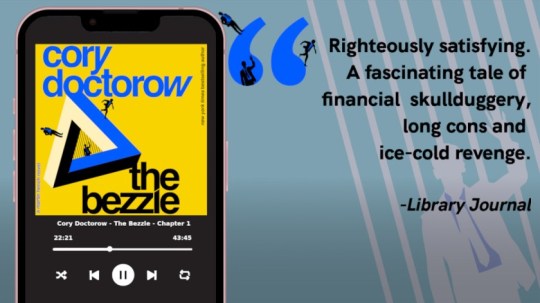
I'm Kickstarting the audiobook for The Bezzle, the sequel to Red Team Blues, narrated by @wilwheaton! You can pre-order the audiobook and ebook, DRM free, as well as the hardcover, signed or unsigned. There's also bundles with Red Team Blues in ebook, audio or paperback.

If you'd like an essay-formatted version of this post to read or share, here's a link to it on pluralistic.net, my surveillance-free, ad-free, tracker-free blog:
https://pluralistic.net/2024/01/25/today-in-tabs/#unfucked-rota
#pluralistic#productivity#life hacks#mozilla#firefox#open web#systems#getting things done#externalized memory#outboard brain#generativitiy
227 notes
·
View notes
Text
You're allowed to do it "wrong"
Growing up, Mom had a lot of rules that were totally arbitrary and had no basis in safety or proper care of the things the rules were about. A couple examples:
Towels had a "correct" way of being folded. And they could only go in the closet when they were folded that way. I once folded a towel wrong and got cussed out for it.
To be "cleaned off", the coffee table top could only have coasters, the remote control, whatever book Mom was currently reading, and maybe a scented candle. Anything extra constituted "clutter", even if it was the book I was currently reading.
But, the other day, I watched a friend fold my towels. They didn't do it the way I do it, which is the way Mom demanded. And I...let it go. Someone else was folding my towels for me. Who cares so long as they get put away?
I keep multiple remotes, coasters, and other things on my coffee table. To make it look tidier, I try making sure everything ends up in a tray on the table. I clean up trash and dirty dishes of course (not as often as I would prefer though). Mom would have told me the tray "just contains the mess" and doesn't mean it's tidy. However, getting everything into the tray looks better than having it all strewn about and lets me keep what I think belongs on the table on the table.
Those are just two things I do wrong now. I also take showers wrong (I use a shower stool to help my back, hips, knees, and ankles). I make my bed wrong. I sometimes load the dishwasher wrong, or run my clothes wrong.
You're allowed to do it "wrong", especially if "wrong" is how it gets done without being unsafe. (In other words, don't do electrical work or use a ladder wrong. But totally use improper technique to paint your wall if it works better for you.)
5 notes
·
View notes
Text

Bill Day
* * * *
Wow! You can’t make this up!
March 21, 2024
ROBERT B. HUBBELL
It’s hard to believe that the dysfunction in the Republican Party could get worse, but Wednesday saw new heights (or depths?) of chaos in the GOP. You are undoubtedly interested in hearing how the GOP impeachment hearing directed at Joe Biden produced damning evidence—against Donald Trump! But first, let’s look away from the GOP car crash to view the important work that President Biden is doing on behalf of the American people. (You’re welcome!)
As Trump and the GOP were entering panic mode at warp speed, President Biden was delivering on his promises to the American people. The Biden administration began the day by announcing a rule that would accelerate the production of hybrid and all-electric cars. See NYTimes, Biden Administration Announces Rule Aimed at Expanding Electric Vehicles. (This article is accessible to all.)
Per the NYTimes,
The Biden administration on Wednesday issued one of the most significant climate regulations in the nation’s history, a rule designed to ensure that the majority of new passenger cars and light trucks sold in the United States are all-electric or hybrids by 2032. Nearly three years in the making, the new tailpipe pollution limits from the Environmental Protection Agency would transform the American automobile market.
Accelerating the transition to hybrid and electric cars will deliver enormous economic and health benefits to the American people. Again, per the Times, the new regulation will
avoid more than seven billion tons of carbon dioxide emissions over the next 30 years . . . That’s the equivalent of removing a year’s worth of all the greenhouse gases generated by the United States . . . . The regulation would provide nearly $100 billion in annual net benefits to society [including] $13 billion of annual public health benefits thanks to improved air quality. The standards would also save the average American driver about $6,000 in reduced fuel and maintenance over the life of a vehicle, the E.P.A. estimated.
As the new “tailpipe emissions” standard was being announced, President Biden announced a massive investment in an Intel chip fabricating facility in Arizona. See Politico, Biden boosts Intel with massive CHIPS payout in swing state Arizona.
Per Politico, Biden said
“We will enable advanced semiconductor manufacturing to make a comeback here in America after 40 years. It’s going to transform the semiconductor industry and create entirely new ecosystems.” Biden said Intel would also invest “over $100 billion” across the country, in facilities in Arizona, Oregon, Ohio and New Mexico. Those investments should put the U.S. on track to produce roughly 20 percent of the world’s leading-edge chips by 2030, Biden said. He added that Intel’s new projects are expected to create 30,000 jobs nationwide in construction and manufacturing.
Beyond creating tens of thousands of jobs in the high-tech sector, the CHIPS and Science Act protects US national security. Recall that during the COVID pandemic, supply chain issues disrupted the flow of semiconductors into the US, hampering the manufacture and sale of hundreds of consumer products that rely on microprocessors. Manufacturing the chips in the US serves as a hedge against that future risk.
For most presidents, the Intel announcement and new tailpipe admissions standard would be the year's crowning achievements. For Joe Biden, those announcements were known as “Wednesday.” Biden gets stuff done. Tell a friend.
[Robert B. Hubbell Newsletter]
#Robert B. Hubbell#Robert B. Hubbell Newsletter#CHIPS#semiconductor manufacturing#jobs#CHIPS and Science act#Biden Administration#getting things done
3 notes
·
View notes
Text
Day 548
When I was little my dad always told me that if I did what I had to do first, then I had all the time leftover to do whatever I wanted. This was in reference to homework, because homework was an issue when I was a child.
I never quite forgot this fact, which is probably why when I knew I had to do something and for whatever reason couldn’t bring myself to do the thing, I would just stare off into space (probably daydreaming) instead of just doing anything. Like, it would have been more productive for me to (at that point) go and do what I wanted to do, if I wasn’t going to do what I had to do.
Not the best way to live one’s life.
My dad’s advice floated through my brain today as I was cleaning the kitchen. It’s not a piece of advice that I disagreed with, in fact as a child I tried to follow that advice whenever I could. It’s been so many years I don’t know how successful I was, but I’d imagine I wasn’t that successful in following that piece of advice.
My mom came in to grab something from the freezer chest at my place while I was cleaning. She was delighted that I was cleaning on a day off. I wondered if I should have told her I’m delighted that I am cleaning too because it means I can do other things with my time.
Like play video games, so many video games…
2 notes
·
View notes
Text
Promoted from the tags:


i find the whole "i had unpleasant experiences with leftists before so now im a raging fascist" narrative incredibly funny because we have all had unpleasant experiences with leftists before. it comes free with being a leftist
#THIS#THIS SO MUCH#well said#how to get things done#politically#and in day-to-day living#progressive politics#left wing#leftists#getting things done#vs absolute purity#the perfect is the enemy of the good#politics#meanwhile in america
35K notes
·
View notes
Text
“This thing is legally dubious and therefore technically unenforceable.” Is not a “useless liberal gotcha” it’s how legalism works in this country. Tying up stupidly worded EOs in court is the quickest way to keep them from being implemented. It is the definition of “doing something.” But it doesn’t usually involve much tweeting so of course a certain type of leftist feels obligated to mock it.
#challenging an EO in court keeps it from being implemented for a very long time and that’s a good thing#not only does it *not get implemented* for usually at least a year as it gets appealed over and over again#it also distracts conservative resources from going full steam ahead because they have to dedicate resources to defending their bullshit in#and the dumber their bullshit is the longer it takes to defend and the less they can get done#this is materially good so yes saying ‘this EO is poorly worded and can be interpreted to mean that all people are now female’#is a valid point to make
24K notes
·
View notes
Text


Our hextech dream….
#the thing is#I’m so excited for the final act to drop#but I’m also so sad because arcane is such a gem#there is very few pieces of media that is so well done#well written well animated well thought out and cared for#the only shows that come close to this level of quality get CANCELLED#So to be able to enjoy a complete and well crafted story as good as this#bro I feel lucky#sad it’s over but I can’t wait#(it’s also insanely rewatchable so I’m not TOO torn up about if#my art#arcane#arcane league of legends#viktor league of legends#viktor arcane#jayce talis#arcane jayce#jayce league of legends#jayvik
32K notes
·
View notes
Text
Getting stuff done, a small miracle, and an attempted kitnapping
It’s mid afternoon as I start to write this, and time to take a break from the heat. Depending on which weather app I look at, our expected high today is supposed to be 22C/72F or 24C/75F. As I write this, one app tells me we are at 23C/73F, while another tells me we are at 21F/70F, with the humidex putting us at 25C/77F. All our outdoor thermometers are in full sun, so they’d be reading high,…
#2025 garden#Arikara squash#black zucchini#Critters#food forest#getting things done#growing food#kittens#miracle#mowing#outside cats#postaday#walnut trees
0 notes